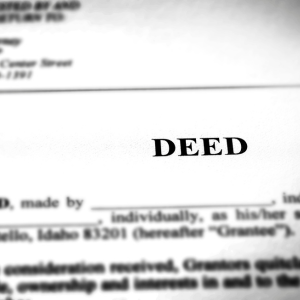
Quitclaim Deed in Texas: An Overview
In Texas, a quitclaim deed transfers real estate ownership without guaranteeing title. Anyone involved in property transactions or real estate-related legal matters must understand how quitclaim deeds work.
What is a Quitclaim Deed?
A quitclaim deed is a legal document that transfers property rights. It differs from other deeds in that it makes no promises about the title’s status, which means there is no guarantee that the grantor owns the property or that the title is free of liens. This type of deed is typically used for quick property transfers between known parties.
Definition and Purpose
A quitclaim deed’s primary purpose is to transfer the grantor’s interest in a piece of real estate. This transfer occurs without warranties, so do your homework before accepting such a deed. To legally transfer property, fill out the quitclaim deed form correctly. Working with a title company can also help ensure a smooth transfer by identifying potential title issues before finalizing the transaction.
Common Uses in Texas

Quitclaim deeds are frequently used in Texas in specific situations, such as:
- Transferring property between relatives or close friends
- Removing a former spouse from the property title following a divorce.
- Simplifying estate planning by transferring interests within family trusts.
- Correcting errors in a property title.
When is a Quitclaim Deed Appropriate?
The type of property transfer determines whether a quitclaim deed is used. In Texas, these deeds are commonly used for non-traditional transactions in which formal warranties are not required.
Situations Suitable for Use
A quitclaim deed is beneficial in several scenarios:
- Changing property ownership among family members
- Transferring interests following a divorce
- Adjusting titles as part of estate planning to prevent disputes
- Moving interest into a living trust
Understanding these scenarios can help you decide if a quitclaim deed fits your real estate needs. For more tailored advice, contact legal experts in Texas real estate law. If you’re thinking about a property transfer using a quitclaim deed, House Buying Girls can help guide you through this process smoothly.
Key Legal Aspects of Filing a Quitclaim Deed in Texas
Filing a quitclaim deed in Texas requires understanding specific legal steps to ensure lawful property transfer. This guide explains the key steps and considerations.
Legal Requirements for Validity

To be legally valid in Texas, a quitclaim deed must meet certain legal requirements and include key elements like:
- Essential Elements Required
- Importance of Accurate Information
Role of Notarization in Texas
In Texas, a quitclaim deed must be notarized. It enhances credibility and ensures that the document satisfies legal requirements.
- Why Notarization is Mandatory
House Buying Girls is ready to assist you with filing a quitclaim deed or any other real estate.
Steps to File a Quitclaim Deed in Texas
How to Prepare Your Quitclaim Deed
A quitclaim deed is required to transfer property ownership to Texas. Here’s how you get started:
- Select the Correct Quitclaim Deed Form: Use a Texas-specific property transfer form. This ensures that it complies with real estate laws and facilitates a smooth title transfer.
- Accurate Property Description: To avoid ownership disputes, include detailed information about the property, such as the address and legal description.
- Identify Grantor and Grantee: State the names of all parties involved. The grantee will receive the property currently owned by the grantor.
Necessary Documentation and Details
Having the proper documents is crucial when filing a quitclaim deed.

- Legal Identification: Verify identities by ensuring that both parties have valid identification.
- Property Description: Provide a detailed legal description of the real estate.
- Previous Title Documents: Keep previous deeds or titles on file for documentation consistency.
Where to Obtain Forms
In Texas, there are several options for obtaining a quitclaim deed form.
- Downloadable Forms: Forms can be downloaded from trusted legal websites.
- Legal Assistance: Consult a lawyer to ensure the quitclaim deed is properly completed.
- County Clerk’s Office: Contact your local county clerk for advice and additional resources.
Where to File Your Quitclaim Deed
Once your deed is ready, file it in the appropriate location:
- Texas County Clerk: Deliver the deed to the county clerk in the county where the property is situated. This makes it a public record.
- Public Records: Once filed, the deed is a legal document that the public can access.
- Legal Procedures: Follow all procedures to avoid complications during the property transfer process.
Texas County Clerk Responsibilities
The county clerk has an important role in property transfers:

- Recording Documentation: The clerk records the deed, confirming the transfer.
- Maintaining Public Records Entails updating them to reflect the new ownership.
- Ensuring Compliance: The clerk verifies that all filings adhere to Texas legal standards.
Filing Fees and Payment Procedures
Filing a quitclaim deed entails some costs:
- Fees Structure: Learn about the filing fees charged by your county clerk.
- Payment Methods: Prepare to pay with cash, check, or credit card.
- Proof of Payment: Include proof of payment in your legal documents for the transaction.
For expert help with your quitclaim deed or other property-related legal matters, contact a professional like House Buying Girls for personalized guidance.
Avoiding Common Mistakes with Quitclaim Deeds
Quitclaim deeds are important legal documents in real estate that help transfer property ownership. However, common mistakes can weaken their effectiveness. To protect your interests, understand these errors and follow the proper steps.
What are the Potential Pitfalls?
Working with quitclaim deeds without full knowledge can lead to issues like:

- Errors: Not attention to details during document preparation can cause inaccuracies or incomplete forms.
- Misunderstandings: Many people wrongly think quitclaim deeds provide warranties or guarantees.
- Unrecorded: Not recording the deed can make it ineffective.
- Incorrect Signing: Legal rules require specific signing procedures; ignoring these can invalidate the document.
To avoid these problems, seek guidance from legal professionals who know real estate law.
Errors in Document Preparation
Accurate document preparation is key. Common mistakes include:
- Incomplete Forms: Fill out all fields accurately and completely.
- Incorrect Property Description: Ensure the description matches official records.
Follow guidelines and consult experts to verify title clarity.
Misunderstanding Legal Limitations
A big misconception is that quitclaim deeds guarantee ownership rights. Important points include:
- No Warranties: Quitclaim deeds transfer interest without any warranties regarding ownership.
- Responsibilities and Liabilities: Know the implications, including the lack of protection against claims.
Consult a real estate lawyer for advice on these limitations.
How to Ensure Proper Execution

Proper execution of the deed is crucial. Follow these steps:
- Signing: Ensure both parties sign the deed.
- Witnessing: Have appropriate witnesses present for the signing.
- Notarization: Use a notary public to validate the document.
- Recording: File the deed with the correct government office.
Following these steps enhances the deed’s effectiveness and legality.
Tips for Correct Signing and Witnessing
Correct signing and witnessing are essential for legal compliance:
- Signatures: Make sure involved parties sign all signature lines.
- Witness Requirements: Check the number and qualifications of needed witnesses.
- Notary Verification: Have a notary public verify the signatures.
Following these procedures reduces the risk of invalidating the quitclaim deed. For detailed guidance, contact House Buying Girls for professional assistance.
The Role of Legal Assistance in Quitclaim Deeds
Understanding quitclaim deeds is vital for any property owner looking to transfer property, especially in Texas. A quitclaim deed allows real estate to transfer hands without any warranties. Seeking legal assistance from an experienced attorney can provide crucial insights into this process.
Why Consult with a Real Estate Attorney?
Consulting a lawyer is essential when filing a quitclaim deed in Texas. Given the complexity of real estate transactions, professional legal advice ensures that all requirements are satisfied. Attorneys can guide you on effectively transferring property in Texas, following state regulations. This guidance can prevent possible risks and make the process smoother.
Benefits of Professional Guidance
Hiring an attorney offers several benefits when dealing with a quitclaim deed:

- Expertise in Real Estate Law: Lawyers understand the specifics of quitclaim deed laws in Texas.
- Avoid Potential Risks: Expert legal assistance can help identify and avoid potential issues.
- Efficient Execution of the Deed: An attorney ensures all parts of the quitclaim deed execution in Texas are properly handled.
How an Attorney Can Assist in the Process
A lawyer significantly aids in the smooth transfer of property through quitclaim deeds. Here’s how legal assistance can help:
- Compliance: Ensures the quitclaim deed checklist for Texas is thoroughly checked, facilitating easy compliance.
- Understanding Costs: Clarifies the costs and complexities involved in the process.
- Process Facilitation: Guides you through each transfer step, making necessary adjustments.
Key Questions to Ask Your Legal Advisor
When seeking legal assistance for your quitclaim deed, it’s important to ask key questions for proper execution. Consider these questions:

- What are the legal steps for a quitclaim deed in Texas?
- How do we comply with Texas laws?
- What costs and complexities should we expect?
- How does the quitclaim deed process work?
- What steps ensure the correct execution of the quitclaim deed?
Understanding these aspects will help ensure a smooth transaction. For professional legal guidance, contact our House Buying Girls team for expert assistance.
This information applies to Texas and its cities like Dallas, Fort Worth, Arlington, and more. For help or questions, call us at (214) 393-8026. You can also visit our website at House Buying Girls for more details.
FAQs:
What is a Quit Claim Deed, and how does it differ from a Warranty Deed in Texas?
A Quit Claim Deed transfers ownership without guaranteeing the title’s validity. In contrast, a Warranty Deed assures that the title is clear of any encumbrances. Understanding these differences is crucial for property transfer in Texas.
Who can file a Quit Claim Deed in Texas?
Any property owner or authorized person can file a Quit Claim Deed in Texas. The deed must be signed, notarized, and filed with the appropriate county clerk.
Are there specific requirements for filing a Quit Claim Deed in Texas?
Yes, the Quit Claim Deed must include the names of the grantor and grantee, a property description, and be notarized before filing with the county clerk. Filing fees vary by county.
Can a Quit Claim Deed be used to transfer property during probate?
While it can transfer ownership rights, a Quit Claim Deed may not be ideal for probate due to lack of warranty. Consult legal advice to determine the best approach for probate transfers.
How do you fill out a Quit Claim Deed form in Texas?
Include the full legal names of the parties involved and a property description in the Quit Claim Deed form. Ensure the form is signed and notarized before filing with the county clerk.
Is title insurance necessary when using a Quit Claim Deed in Texas?
Title insurance isn’t legally required with a Quit Claim Deed but is recommended for protection against claims on the property’s title.
What are the filing fees for a Quit Claim Deed in Texas?
Filing fees range from $10 to $30 and vary by county. Check with the local county clerk’s office for specific pricing.
Can a Quit Claim Deed be used to transfer joint tenancy in Texas?
Yes, a Quit Claim Deed can transfer joint tenancy rights in Texas. However, it’s essential to get legal guidance to handle joint tenancy nuances properly.
Key Insights
- Learn how to file a quitclaim deed in Texas for a smooth property transfer. We provide guidance on the legal procedures and requirements for accurate filing.
- Our experts clarify the differences between a quitclaim deed and a warranty deed in Texas, helping you make informed decisions.
- Discover the steps involved in the Texas quitclaim deed process, including preparation, execution, notarization, and recording with the county clerk’s office.
- Ensure compliance with state laws by understanding the specific quitclaim deed requirements and necessary legal documents for a Texas property transfer.
- Get insights into the associated fees and costs, like the quitclaim deed filing fee in Texas, to help you budget effectively.
- Understand the implications of using a quitclaim deed for real property transactions, including ownership titles and potential liabilities.
- Grantees should be aware of their responsibilities under a quitclaim deed in Texas, including dispute resolution and title validation considerations.
- Our website provides downloadable forms and templates for quitclaim deeds in Texas, along with step-by-step instructions for filling them out correctly.
- Contact us to discuss your situation and learn how our real estate services can efficiently assist you in completing your quitclaim deed process in Texas.


